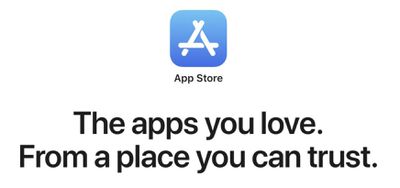The problem of scam iOS apps has dogged Apple's App Store for some years now, but over last two weeks the developer Kosta Eleftheriou has taken to Twitter to highlight that the problem remains as big as ever in at least some app categories – and also offered iOS users a way to spot them.

Taking blatant rip-offs of his own popular FlickType Apple Watch keyboard app as an example of how scammers prey on and exploit the work of genuine app developers, Eleftheriou exposed some of the ways these scams work.
Just a few months ago, I was way ahead of my competition. By the time they figured out just how hard autocorrect algorithms were, I was already rolling out the swipe version of my keyboard, quickly approaching iPhone typing speeds. So how did they beat me?
First, they made an app that appeared to fulfill the promise of a watch keyboard – but was practically unusable. Then, they started heavily advertising on FB & Instagram, using my own promo video, of my own app, with my actual name on it.
According to Eleftheriou, there are several clones of his FlickType app, but one of the most clear non-functional rip-offs was "KeyWatch," which launched with a blank interface and an "Unlock now" button. Tapping the button prompted users to confirm an $8/week subscription for an app that doesn't do anything.
According to Eleftheriou, the scam achieved prominence in the App Store by gaming Apple's algorithmic ranking system through the purchase of fake ratings and glowing five-star reviews, which bumped it up to the top of its app category. It even advertised its software using his own promotional video, which includes his actual name.
Up to now, I've been in the "Apple *wants* to do the right thing" camp. My viewpoint is starting to change. How to spot a $5M/year scam on the @AppStore, in 5 minutes flat:👇 — Kosta Eleftheriou (@keleftheriou) February 6, 2021
Apple has since removed the fake app from the App Store, although the developer account responsible for multiple scam apps remains active. Eleftheriou says that before KeyWatch was taken down, the developers had long benefited from what had become a $2 million-per-year scam that went largely unnoticed by Apple moderators until he personally exposed it.
Since that time, Eleftheriou has been on a mission to expose more scam apps in the App Store, such as the so-called star gazing app that goes by the name "Star Gazer+" and basically uses the same time-proven strategy of masquerading as a genuine app that's barely functional and hoodwinks users into an exorbitant in-app weekly subscription fee.
As of writing, the scam app "Star Gazer+" is still listed on the App Store with 4.5 star average rating and over 80,000 reviews.
Eleftheriou's exposure of the rampant App Store scheme has led many more developers and critics to share their own experiences and hopefully put pressure on Apple to tighten up its app moderation and consider overhauling its billing interface and options, including the suggestion of removing the weekly subscription option altogether.
Update: In a statement provided to The Verge, Apple said that it does not tolerate fraudulent activity on the App Store and that its Discovery Fraud team is actively working to remove violations.
We take feedback regarding fraudulent activity seriously, and investigate and take action on each report. The App Store is designed to be a safe and trusted place for users to get apps, and a great opportunity for developers to be successful. We do not tolerate fraudulent activity on the App Store, and have stringent rules against apps and developers who attempt to cheat the system. In 2020 alone, we terminated over half a million developer accounts for fraud, and removed over 60 million user reviews that were considered spam. As part of our ongoing efforts to maintain the integrity of our platform, our Discovery Fraud team actively works to remove these kinds of violations, and is constantly improving their process along the way.























